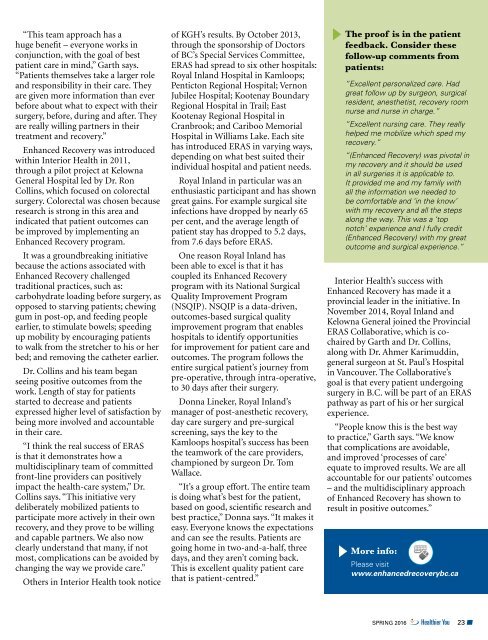Healthier You
1q9UNXu
1q9UNXu
Create successful ePaper yourself
Turn your PDF publications into a flip-book with our unique Google optimized e-Paper software.
“This team approach has a<br />
huge benefit – everyone works in<br />
conjunction, with the goal of best<br />
patient care in mind,” Garth says.<br />
“Patients themselves take a larger role<br />
and responsibility in their care. They<br />
are given more information than ever<br />
before about what to expect with their<br />
surgery, before, during and after. They<br />
are really willing partners in their<br />
treatment and recovery.”<br />
Enhanced Recovery was introduced<br />
within Interior Health in 2011,<br />
through a pilot project at Kelowna<br />
General Hospital led by Dr. Ron<br />
Collins, which focused on colorectal<br />
surgery. Colorectal was chosen because<br />
research is strong in this area and<br />
indicated that patient outcomes can<br />
be improved by implementing an<br />
Enhanced Recovery program.<br />
It was a groundbreaking initiative<br />
because the actions associated with<br />
Enhanced Recovery challenged<br />
traditional practices, such as:<br />
carbohydrate loading before surgery, as<br />
opposed to starving patients; chewing<br />
gum in post-op, and feeding people<br />
earlier, to stimulate bowels; speeding<br />
up mobility by encouraging patients<br />
to walk from the stretcher to his or her<br />
bed; and removing the catheter earlier.<br />
Dr. Collins and his team began<br />
seeing positive outcomes from the<br />
work. Length of stay for patients<br />
started to decrease and patients<br />
expressed higher level of satisfaction by<br />
being more involved and accountable<br />
in their care.<br />
“I think the real success of ERAS<br />
is that it demonstrates how a<br />
multidisciplinary team of committed<br />
front-line providers can positively<br />
impact the health-care system,” Dr.<br />
Collins says. “This initiative very<br />
deliberately mobilized patients to<br />
participate more actively in their own<br />
recovery, and they prove to be willing<br />
and capable partners. We also now<br />
clearly understand that many, if not<br />
most, complications can be avoided by<br />
changing the way we provide care.”<br />
Others in Interior Health took notice<br />
of KGH’s results. By October 2013,<br />
through the sponsorship of Doctors<br />
of BC’s Special Services Committee,<br />
ERAS had spread to six other hospitals:<br />
Royal Inland Hospital in Kamloops;<br />
Penticton Regional Hospital; Vernon<br />
Jubilee Hospital; Kootenay Boundary<br />
Regional Hospital in Trail; East<br />
Kootenay Regional Hospital in<br />
Cranbrook; and Cariboo Memorial<br />
Hospital in Williams Lake. Each site<br />
has introduced ERAS in varying ways,<br />
depending on what best suited their<br />
individual hospital and patient needs.<br />
Royal Inland in particular was an<br />
enthusiastic participant and has shown<br />
great gains. For example surgical site<br />
infections have dropped by nearly 65<br />
per cent, and the average length of<br />
patient stay has dropped to 5.2 days,<br />
from 7.6 days before ERAS.<br />
One reason Royal Inland has<br />
been able to excel is that it has<br />
coupled its Enhanced Recovery<br />
program with its National Surgical<br />
Quality Improvement Program<br />
(NSQIP). NSQIP is a data-driven,<br />
outcomes-based surgical quality<br />
improvement program that enables<br />
hospitals to identify opportunities<br />
for improvement for patient care and<br />
outcomes. The program follows the<br />
entire surgical patient’s journey from<br />
pre-operative, through intra-operative,<br />
to 30 days after their surgery.<br />
Donna Lineker, Royal Inland’s<br />
manager of post-anesthetic recovery,<br />
day care surgery and pre-surgical<br />
screening, says the key to the<br />
Kamloops hospital’s success has been<br />
the teamwork of the care providers,<br />
championed by surgeon Dr. Tom<br />
Wallace.<br />
“It’s a group effort. The entire team<br />
is doing what’s best for the patient,<br />
based on good, scientific research and<br />
best practice,” Donna says. “It makes it<br />
easy. Everyone knows the expectations<br />
and can see the results. Patients are<br />
going home in two-and-a-half, three<br />
days, and they aren’t coming back.<br />
This is excellent quality patient care<br />
that is patient-centred.”<br />
The proof is in the patient<br />
feedback. Consider these<br />
follow-up comments from<br />
patients:<br />
“Excellent personalized care. Had<br />
great follow up by surgeon, surgical<br />
resident, anesthetist, recovery room<br />
nurse and nurse in charge.”<br />
“Excellent nursing care. They really<br />
helped me mobilize which sped my<br />
recovery.”<br />
“(Enhanced Recovery) was pivotal in<br />
my recovery and it should be used<br />
in all surgeries it is applicable to.<br />
It provided me and my family with<br />
all the information we needed to<br />
be comfortable and ‘in the know’<br />
with my recovery and all the steps<br />
along the way. This was a ‘top<br />
notch’ experience and I fully credit<br />
(Enhanced Recovery) with my great<br />
outcome and surgical experience.”<br />
Interior Health’s success with<br />
Enhanced Recovery has made it a<br />
provincial leader in the initiative. In<br />
November 2014, Royal Inland and<br />
Kelowna General joined the Provincial<br />
ERAS Collaborative, which is cochaired<br />
by Garth and Dr. Collins,<br />
along with Dr. Ahmer Karimuddin,<br />
general surgeon at St. Paul’s Hospital<br />
in Vancouver. The Collaborative’s<br />
goal is that every patient undergoing<br />
surgery in B.C. will be part of an ERAS<br />
pathway as part of his or her surgical<br />
experience.<br />
“People know this is the best way<br />
to practice,” Garth says. “We know<br />
that complications are avoidable,<br />
and improved ‘processes of care’<br />
equate to improved results. We are all<br />
accountable for our patients’ outcomes<br />
– and the multidisciplinary approach<br />
of Enhanced Recovery has shown to<br />
result in positive outcomes.”<br />
More info:<br />
Please visit<br />
www.enhancedrecoverybc.ca<br />
spring 2016 <strong>Healthier</strong> <strong>You</strong> 23


